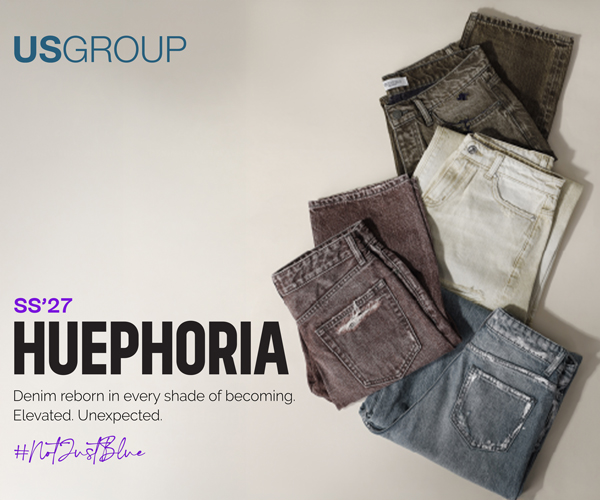A French denim renaissance

In the country that invented denim, a new generation of entrepreneurs has decided to prove that it is once again possible to make jeans in France. Then came covid-19. It pressed home the need to rebuild a sustainable and ethical local supply chain.
Here and there, examples of companies seeking to revive local manufacturing, create jobs and build new businesses in denim and jeans are evident. In the US, Vidalia Mills, which acquired Cone’s vintage Draper looms, comes to mind, as does Hiut Denim Co, which has reintroduced a jeans manufacturing factory in Cardigan, Wales. In France, a growing number of up-and-coming brands, backed by mills that are putting old machines back into operation, are effectively ushering in a denim renaissance.
Mapping out their endeavours reads like a lesson in geography. This is the inspiration behind 1083, a brand founded in 2013 by Thomas Huriez with his brother Gregoire. The number represents the distance between the country’s two most remote towns, Menton in the southeast corner, and Porspoder, at the western most tip of Brittany. Before launching 1083, he had given up a career in computers to open a store offering ethical and eco-friendly brands in 2007 in Romans, incidentally France’s shoe-making capital. Over the years, he says it became increasingly difficult to find brands making their goods in France and the styles they offered were a bit too granola-ethnic to his liking, encouraging him to launch a brand of ethical and sustainable jeans and sneakers. The young company is now in the process of acquiring a former Charles Jourdan shoe factory in Romans. Built in 1921, the 6,000 square-metre space will house all of the company’s operations.
In Florac, a town in the south of France located some 100km from Nîmes, the Tuffery family has been making jeans since 1892. In 2014, Julien Tuffery and his wife Myriam, members of the fourth generation, took over the company with the goal to revive the family’s historical “jeans tailoring” business. The original atelier is now too small, and a new building is in the works that will triple the size of the historic facility (from 600 to 2,000 square metres) in two years’ time. Starting with a staff of four in 2014, Atelier Tuffery now has 18 employees, and three recruits will join the team this autumn after having completed a 14-month training course.
The story of Atelier de la Venise Normande (AVN), a brand of organic and recycled cotton jeans founded by Olivier Lebas and Arthur Cochin in 2014, is firmly rooted in Normandy, as its name implies. The two young men grew up in Pont-Audemer, a town crisscrossed by canals created for the tanners that worked there in the 18th century, and incidentally where Thierry Hermès learned the art of saddle-making in the 1830s. The duo is currently busy fixing up the former town hall that will serve as its boutique, showroom, office, stock and logistics centre.
Le Gaulois is another brand of jeans made in France, launched in 2019 by Jean-Charles Tchakirian. His ties to the world of denim are linked to his parents’ jeans business. “Our family has been in denim since 1974,” he says. Adapting to changing market conditions, the company first made its jeans in France, then in the Maghreb (North-west Africa), Portugal and Eastern Europe. When quotas were phased out in Europe in 2005 and fast fashion took off, it closed. Mr Tchakirian intends to prove that it is possible to build a sustainable brand in France, using local materials, namely linen, and manufacturing in the Lyon region. Fittingly, he has named his company Phoenix Jeans.
Local manufacturers and mills
Determined to source their materials and manufacture their jeans in France, these up-and-coming brands share a broader goal to rebuild a local supply chain and have been lucky to find mills and manufacturers that embrace the same vision. Spinners, weavers, cutting and sewing facilities and laundries are making it possible to produce jeans in France, from the yarn down to the last rivet. A few gaps in the supply chain do require the boundaries to be stretched a bit to encompass Italian, German and Spanish companies.
When looking for a manufacturing facility, AVN knocked on the door of Kiplay, a company also based in Normandy and specialising in workwear that had resisted the move to offshore its production throughout its near 100 years of activity. The company started doing business in 1921 and is now headed by Marc Pradal, grandson of the founder and also president of UFIMH (Union Française des Industries de la Mode et de l’Habillement), a trade organisation for the French fashion and apparel industries. Marc Pradal welcomed the opportunity to diversify his company’s activities, knowing that the shift from workwear to jeans-making is not a big leap. It even inspired him to launch a brand of vintage workwear/denimwear under the Kiplay Vintage label. It is a move that “has helped boost our visibility and attract other brands looking for local manufacturers,” he says. The company invested in new and automated sewing machines, hiring 15 people in the process. It even acquired a nearby industrial laundering facility in 2019 to offer a wider array of in-house finishes.
A key figure in the revival of the French textile industry, Pierre Schmitt firmly believes it is possible to reverse the trend to manufacture offshore. “Having all of our yarns, fabrics and clothes made on the other side of the planet can in no way be considered normal or logical,” he says. “The European fashion and textile industry has settled into the relative comfort of manufacturing in the Far East thinking that this system could go on forever and that we could offload our pollution to Asia. This is an aberration, an accident of history.” Over the past 20 years, he has acquired and saved several ailing mills in Alsace, including velvet and flats specialist Velcorex (2010), tweed maker Tissages des Chaumes (2012) and spinner Emanuel Lang (2013). Finding it unfortunate that France, a leading producer of linen, no longer had any linen spinning facility on its territory, Mr Schmitt bought and brought back from Hungary six Schlumberger spinning machines (made in France!) to set them up at the Emanuel Lang factory.
From farm to factory
For this cast of made-in-France purists, cotton cannot be the fibre of choice in a country that is one of the world’s leading producers of linen, and one of the few in Europe to have maintained hemp farming. Many believe that early denim fabrics woven in Nîmes were made from hemp, not cotton.
Drawing on Pierre Schmitt’s example, and supported by the businessman, a group of companies has set up a collective project to reintroduce linen and hemp spinning in France. Linpossible, as the project is called, plans to set up facilities specialising in all three yarn-making techniques, with dry spinning at Emanuel Lang, wet spinning at Safilin in Normandy, and open-end spinning, for cottonised linen or hemp, at Tissage de France, a company that 1083 helped save from closure and acquired in 2018. Testing the waters, before these three projects come into being, 1083 has launched a limited-edition range of linen jeans this autumn.
For its launch collection, Le Gaulois decided against cotton in favour of linen, choosing fibres that are grown in France, spun in Poland by French-owned Safilin, and woven into denim in the Lyon region. This enables the brand to proudly boast a 98% French make, says Jean-Charles Tchakirian. He points out that cotton consumes much more water, energy and chemicals than linen, which grows without irrigation and can be made into yarn more sustainably.
As it is located in the south of France, where hemp is grown and not linen, Atelier Tuffery chose to create a range of hemp denim jeans. It has partnered with and invested in a local cooperative, VirgoCoop – the fibres are spun into yarn in Europe (by Safilin in Poland, or Cavvas in Romania) and woven in a local mill. Julien Tuffery plans to source its hemp yarns from Emanuel Lang when it will add the natural fibre to its offering. He has also set his eyes on another local fibre, as the region is home to many sheep farmers who supply milk to the local makers of Roquefort blue cheese. The animals’ fleece was not being used, until Julien Tuffery had it collected, cleaned, spun and woven with cotton to make winter denim fabrics. For its traditional organic cotton denims, the company buys its fabrics from Berto, in Italy, and Royo, in Spain. “From a carbon footprint point of view, it may be better for us to source our denims in the Veneto region than in Roubaix, in the north of France, which is actually further away,” he says.
Recycled cotton
With the exception of Jean Fil, a new company that is growing cotton in the Gers region to make polo shirts in France from fibre to finished product, the country does not produce any cotton. For the brands looking to make their jeans exclusively in France, the only solution is to mine the natural fibre from old jeans and deadstock.
AVN was the first French brand to make jeans in Candiani’s award winning 50% recycled cotton and 50% Lenzing Refibra denim. But it has also created a small range made in 100% recycled cotton with its weaving partner Manufacture Métis. Located in Etupes, in the east of France, the mill was founded in 2016 by Cédric Plumey who has been acquiring and fixing up old looms – needless to say – salvaged from various factories in France. He located a stock of spools in a closed spinning mill in the nearby Vosges region which were already dyed in blue and combined them with undyed cotton yarns drawn from spinning waste, which he spun on a vintage shuttle loom, Arthur Cochin tells Inside Denim. The brand produced a small series of jeans, and still has a few bolts of the selvedge denim fabric left.
1083 has two ongoing research projects to recycle cotton. It has found support at Eco-TLC, a French non-profit that uses funds collected through a retail tax to increase the collection of used textiles and shoes and finance research in recycling. Together, the two partners are working on making 100% recycled cotton yarns by mechanically shredding used jeans or chemically dissolving cotton into a manmade cellulosic fibre. “We have achieved proof of concept in the lab, and now need to move on to the industrial phase. The project won an Innovation in Sustainability award from the ADEME (French ecological transition agency) but covid-19 has slowed progress,” says Mr Huriez.
The company has also created a range of jeans made from recycled polyester supplied by Seaqual, an organisation that collects ocean plastics to make recycled fibres. “These jeans are not innovative because they are made in recycled polyester,” says Mr Huriez, “but because all of their components – labels, buttons and sewing thread included – are made from recycled polyester. This means that the jeans can truly be recycled.” When consumers buy a style from the Infini jeans range, they are requested to pay a €20 deposit fee to encourage them to bring the item back to 1083.
Scaling up
Not all projects to manufacture jeans in France are small scale. FashionCube, an organisation created by a group of Mulliez family owned brands including Jules, Brice and Bizzbee, is preparing a more ambitious industrial operation. Based in the north of France, it plans to harness big data and automation to build a facility capable of adjusting production to demand and thereby reduce waste. The factory and laundering facility would employ 76 people and could begin operations in late 2021, producing 410,000 jeans annually for its brands, states the company. It believes advanced technology can make it possible to manufacture jeans at competitive prices.
“Whatever the place or conditions of production, the market is ruled by the big brands whose jeans are sold between €99 to €120,” says Kiplay CEO Marc Pradal. This means that despite all their efforts, the new generation French brands will remain small scale. “But if one zooms out to the broader EuroMed region, the notion of local manufacturing could grow to a larger scale,” he says.
“The only way to create responsible products and reduce our impact on the environment is to produce less and better,” says Thomas Huriez. He points out that big brands apply big mark-ups and cannot switch their entire production to sustainable materials or ethical manufacturing conditions. He does believe, however, that “it is possible to find the right balance between a short supply chain and demand for products made in France, as they are ultimately linked”. When the company started in 2013, he says, “my brother and I were the only employees and the company made €200,000. In 2019, we are now 70 strong, we made 50,000 jeans and our sales are now €8 million.”
The covid-19 situation has attracted the attention of both the public and government institutions to the many missing links in the country’s manufacturing infrastructure, points out Pierre Schmitt. “We realised we could not even make a basic mask in France,” says Mr Huriez.
The French government is preparing to launch a programme to support textile and apparel manufacturers. Building on the efforts of this new generation of entrepreneurs, this positive environment may help boost the emerging denim renaissance in France and possibly help create a more balanced denim industry.
Launched on a crowdfunding site in 2019, Le Gaulois jeans are made in linen grown in France; all operations from weaving to finishing are conducted in the country, and a few supplies are sourced in Germany.
PHOTO: Le Gaulois













